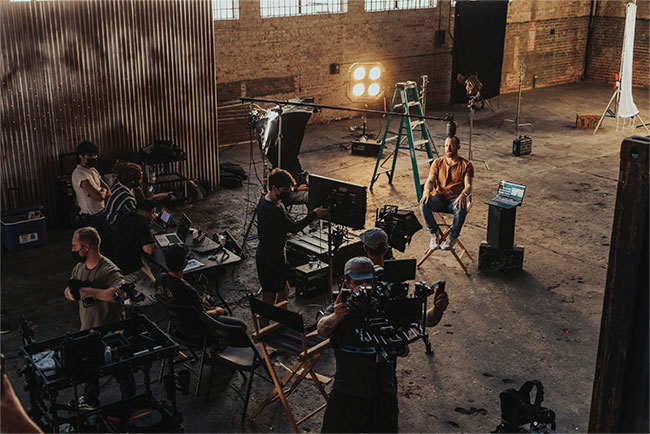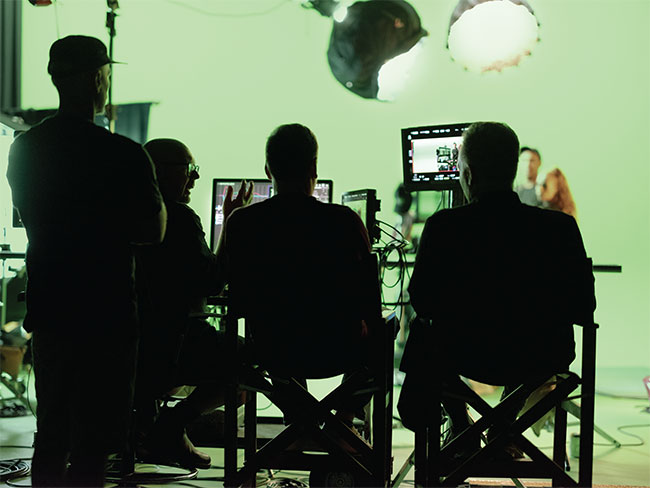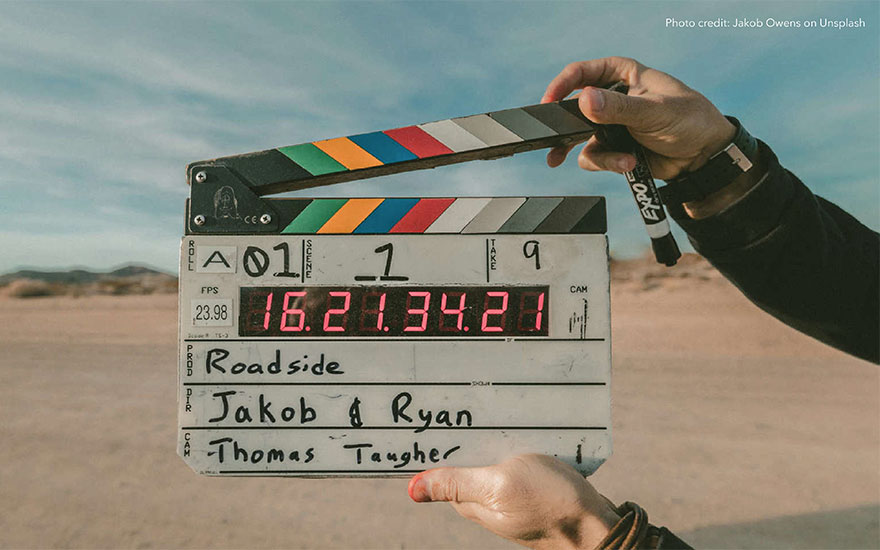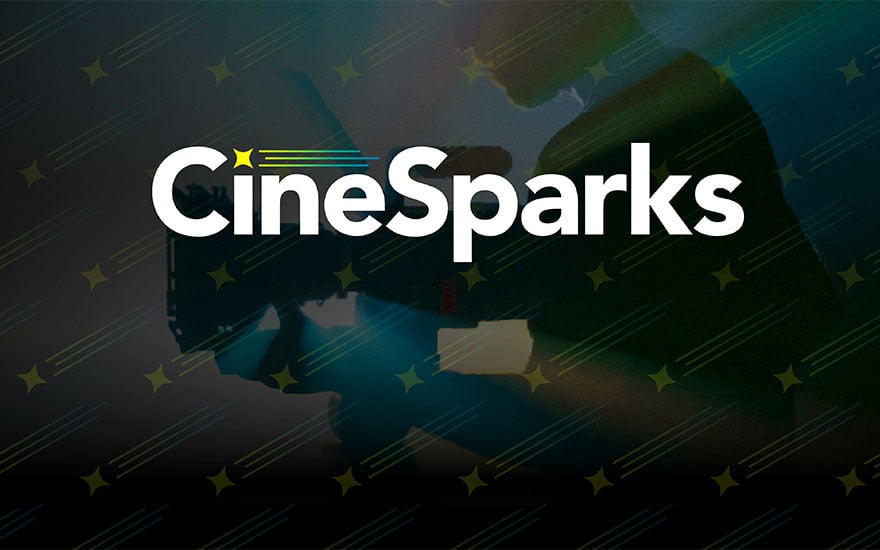We recap the series and some key takeaways from each webinar
Throughout October, we hosted CineSparks, a webinar series that examined a range of topics in the cinema industry designed for the next generation of industry professionals. We worked our connections and spoke with people including Geoff Burdick from Lightstorm Entertainment, Dirk Blackman, writer of "Outlander" and "Underworld: Rise of the Lycans", and Mike Urban, CEO and co-founder of The Rebel Fleet.
If you didn’t have a chance to catch all nine (!) webinars, don’t worry. Here’s a breakdown of each webinar, and key takeaways from each. Grab some popcorn, and let’s get going!
When technology and creativity collide: Join Lightstorm’s Geoff Burdick
Christie’s Brian Claypool, our executive vice president of Cinema, is joined by Geoff Burdick, senior vice president, product services and technology at Lightstorm Entertainment to talk about trends in content consumption and different approaches to working in the industry.
Geoff talks about working on the “Avatar” films and why they created thousands of masters, the shift from 35mm to digital, and what success looks like for Lightstorm. And Geoff’s advice for the next generation who want to get into production or post-production?
“Don’t pigeonhole yourself too much…try to keep your mind open. It may not be where you want to focus 20 years from now, or even 10 or five, so the more you learn about the industry…like the pipeline and consumption – keeps your options open.”
The rise of hyperlocal content in Southeast Asian cinema and the future of cinema technology

In this session, Singaporean filmmaker Yee Wei Chai delves into the growing trend of hyperlocal content in Southeast Asian cinema, highlighting how deeply local stories can resonate with regional audiences.
Using his own film, “Wonderland”, as a case study, he emphasizes the cultural nuances in storytelling, especially within family dynamics, that make hyperlocal films relatable across diverse audiences. “Digging to find what makes us unique—whether that’s in cultural details, values, or storytelling style—that’s our unique selling point,” says Yee Wei. “Audiences around the world want to see something fresh, and hyperlocal content brings that fresh perspective.”
He also explores the evolving role of technology, which empowers filmmakers to elevate production quality and deepen audience engagement without additional costs. As Southeast Asian box office numbers for domestic films soar, he underscores the opportunity for filmmakers to leverage their unique cultural perspectives to create universally appealing narratives.
He concludes with advice to emerging filmmakers, urging them to embrace their cultural identity as a unique selling point and to harness advancing technologies to bring these authentic stories to life on the global stage. “The cost of doing quality films has dramatically been reduced... especially for dramas, there’s no excuse for us to say, ‘We can’t match Hollywood quality,’ and for Southeast Asian filmmakers, that’s a huge opportunity. It’s really about knowing how to get the most out of the technology available to you.”
From newbie to high-flyer: What it takes to make it in cinema
Rebecca Pahle, deputy editor of Boxoffice Pro, speaks with Dr. Heather Morgan, chief content officer, Alamo Drafthouse Cinema, and Mariam El Bacha, a cinema industry veteran, about what it takes to make it as an exhibitor.
Mariam got her start by responding to a newspaper ad placed by Village Cinemas in Argentina. She started as an assistant manager, and in her words, “I never left the industry!”
After receiving her PhD in industrial-organizational psychology, Heather started consulting. One of her early clients was AMC – her first foray into the cinema exhibition industry. She later transitioned over to the film side of the business. “You start on a path – and you have no idea where it leads – but one opportunity leads to another, which leads to another,” says Heather.
Looking back on their careers thus far, Heather and Mariam share their advice for the next generation. “Relationships are important, and I say that as someone who came into this industry not knowing anyone. I didn’t grow up in LA, I don’t have family here, and I never had any connections to the cinema industry. Who you know in this business is incredibly important to opportunities and career growth,” says Heather.
Mariam advises a flexible approach to growth. She left Argentina as a cinema manager for a role as a floor supervisor in London for Village Cinemas. “I was not afraid to go backward in my position to go to another path,” says Mariam.
“In order to grow, you need to get comfortable with situations that are uncomfortable,” concludes Heather.
Making the right mistakes to stay relevant in cinema

This webinar is for next-gen creatives! Christie’s Scott Kennard speaks with Dirk Blackman, writer of “Outlander” and “Underworld: Rise of the Lycans” and adjunct professor at Columbia College Chicago, about his experience as a writer in Hollywood – and what you can learn from his mistakes.
From selecting your first manager and networking to sending your best work and the role of endurance and luck in the industry, Dirk covers the steps to get started as a screenwriter. He also dives into practical aspects of screenwriting, including what to do about “the note beneath the note” when you aren’t sure how to tackle it.
Ultimately, says Dirk, “Don’t wait for studios to notice you…make things! Put yourself out there as a creator, not as someone who waits for things to happen to them.”
Virtual production and AI: Enter the new paradigm of filmmaking
Chris Barnett, our manager of public and live events, speaks with Edward Dawson-Taylor, co-founder and head of technology at CG Pro School, about getting into the special effects and virtual production industries, artificial intelligence, and the skills needed to succeed.
With a resume that includes the movies “Jungle Book,” “Jurassic World,” and “The Lion King,” as well as commercials and music videos, Edward reflects on the path that led him into this industry, which included a degree in computer science, and whether it’s still relevant.
“I’m not sure that it’s [a computer science degree] entirely necessary. But my degree taught me very thoroughly how computers work and gave me a good sense of problem-solving, which is one of the greatest skills you can have as an artist or engineer,” he explains. “Being able to look at something lofty or complicated...and break it down into small things, it’s solvable. That mindset, regardless of changes in technology, has been very important.”
And when it comes to AI? “There’s a huge amount of excitement about tools that can seemingly make high-fidelity videos with just a few words,” he says. “I think we’re all excited about it because we’re lazy! We want to make things more efficient and easier and, in VFX, create things using AI that haven’t been made before.”
However, he emphasizes that for those entering the industry, “What’s useful now is what’s been useful for the past 20 years: really solid fundamentals. On the tech side, understanding how computers work, and on the artistic side, learning to draw.”
The future of filmmaking: Streamlining production to post

Eric Roth, VFX supervisor and creative technologist, and Michael Urban, co-founder and CEO of The Rebel Fleet and Konsol talk to Christina Lee Storm about their journeys and how technology is transforming workflows in post-production.
Eric considers what he wishes he had known when he was first starting out. “Embrace technology early,” advises Eric. “It’s a technology job!” Michael echoes the sentiment. “I’m not there to figure out how a script gets translated, or how it resonates with the emotion in the scene. Instead, I support creative people deliver what they need through technical solutions.”
Eric and Michael explain the steps in streamlining VFX: pre-planning, capturing on-set metadata, and creating a post-workflow strategy. And a metadata workflow is critical. “VFX is often running parallel to the production…we really try to build out the VFX pipeline,” says Michael.
And what should the nextgen know about this changing industry? In the next 5-10 years Eric believes that the flow of data and the way the cloud is working will improve. “I’m excited for that to be a more seamless process, and to create more accessibility in virtual production around the world,” he says. Michael agrees, and adds, “I think we’ll see greater accessibility to VFX tools and technology to empower the creative process.”
Tech meets cinema: Unlocking technical careers in the industry
Whether your passion is audio, engineering, or IT, there’s a role for you in festivals and cinemas. In this webinar, Dominic Simmons, head of cinema technology at the British Film Institute, and James King, senior technical manager at Toronto International Film Festival talk about their roles and the skills needed to work at two of the world’s premiere cinema organizations.
Dominic manages the technical teams at BFI and the technical operations for BFI Southbank, a four-screen cinema, and BFI IMAX. James is the senior technical manager at the TIFF Lightbox, the headquarters for TIFF, with six operational cinemas that screen various formats, including 35mm,70mm, and DCP. “I think what’s really helped me [in my career] is being a film nerd,” says James. “If you have an understanding of film history, it really helps you understand the technology and what makes a good presentation.”
Both James and Dominic point to the role of technical skills in their careers. “The skills haven’t changed as much as they’ve broadened,” explains Dominic. With the transition to digital cinema projection, more technical skills were required. “You still need to show a film, but you also need to know about networking, IP, and how equipment communicates with each other. The world of projection has expanded.”
And for the next generation who are interested in a career in the film festival industry, James has two words of advice: “Pester power” (but in the most positive way!)
Building teams through cross-generational collaboration
For the next generation of talent entering the cinema industry, effectively working with Millennials, Gen X, and Baby Boomers will be the norm. But what does it mean to work across generations, and how do you collaborate effectively? Rossy Eguigure, co-chair of HPA Women in Post (WIP) and owner of Rx Media Productions, Inc., and Beatriz Rodriguez, a post-production professional in Hollywood and WIP Committee Member dive into why age-inclusive teams lead to better outcomes with moderator Payton List, director of production and post at Fox Entertainment Technology Group.
With people staying longer in the workforce, what’s the key to working cross-generationally? Beatriz and Rossy point to understanding the differences and priorities of each generation. For example, says Beatriz, “Gen Z’s work/life balance goes beyond leaving work on time. It’s about recognizing when to step back and recharge. My generation values flexibility and setting boundaries. It’s about bringing out best selves to work.”
However, says Rossy, “Our similarities outweigh our differences.” Rossy has mentored some of the brightest minds in the industry, and it’s a mutual learning experience. “Ask questions and be proactive!” she advises.
While some of the challenges across generations include different communication styles, “Mutual respect is key,” says Rossy. Beatriz offers suggestions to bridge generational divides, including implementing flexible communication styles, encouraging mutual mentorship programs, and celebrating achievements and milestones as a team.
“Stereotypes are only part of the story. To navigate the changes in the industry…we all must work together,” adds Rossy.
Where are they now? Award-winning NFTS graduates talk about how to succeed in filmmaking

Are you a film school graduate wondering, “What’s next?” This webinar is for you! We talk to graduates of the UK’s National Film and Television School about their paths post-graduation. Colorist Michael Pearce is a 2020 graduate with a Visual Effects MA; Lisa Kenney graduated in 2023 with a Directing Animation MA; and Andrew Oldbury is a 2017 graduate with an MA in Production. They chat with Lizzie Francke, head of directing at the NFTS about getting started.
It can be daunting to get started in the industry; however, Andrew advises networking sideways. “I came to the film school, and it allowed me to build a wonderful peer and support group.” So many roles come from word of mouth, that putting yourself in front of people is very important, says Michael.
Lisa has found that being a “good people person” is a critical soft skill now that she’s pitching her ideas and projects. Andrew, who is on the production side of the business, points to empathy and curiosity. “It’s hard to make a film or TV show, but I do think the way you conduct yourself can make it either harder or a more enjoyable process.”
Michael, who is a colorist, echoes the need for empathy in the creative process. “Working in post-production, which is a very service-based industry, you really need to have a vital understanding of empathy and connection with your clients. Your clients need to feel heard and accepted for their ideas, which were made months before you were involved.”
The panelists emphasized that their journeys haven’t been linear, and instead have focused on their skills. “Perseverance is worth it. It’s really easy to fall prey to imposter syndrome in this industry, but everyone has a story to tell,” says Andrew.
Ultimately, “Keep making things,” says Lisa.


